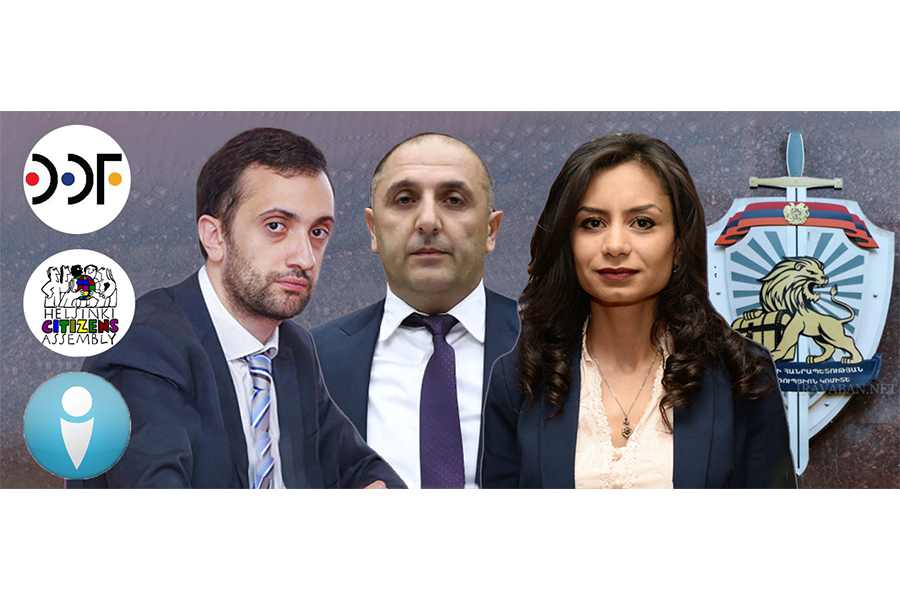
Iravaban.net, staying true to its mission in covering anti-corruption efforts, continues its series of investigative articles, this time focusing on two key processes: the selection of the Anti-Corruption Committee Chairman and the appointment of the RA Prosecutor General’s coordinating deputy for confiscation of illegally obtained property. The detection of corruption crimes and confiscation of illegal property are crucial for the effectiveness of anti-corruption policy in the country.
The investigation will reveal the transparency of these appointments, the level of independence of subjects involved in these positions, and candidates’ compliance with legally established criteria.
On December 11, 2024, the inaugural meeting of the Competition Council formed for selecting candidates for the Anti-Corruption Committee Chairman was held in the Government, during which the council composition was also revealed.
Thus, the Competition Council includes:
- Edgar Arsenyan, Head of the Department of Supervision over Pre-trial Proceedings’ Legality in the Anti-Corruption Committee of the RA Prosecutor General’s Office
- Aharon Nersisyan, Advisor to the National Assembly Chairman
- Yeprem Karapetyan, Head of Anti-Corruption Policy Development and Monitoring Department at the Ministry of Justice
- Karen Tumanyan, Member of the Supreme Judicial Council
- Daniel Ioannisyan, Founder of “Informed Citizens Union” NGO
- Ani Chatinyan, Legal Department Coordinator at HCA Vanadzor Office
During the first session, the council also had to elect a chairman. There were no self-nominations, at which point Ms. Chatinyan announced that she was nominating Karen Tumanyan’s candidacy as chairman of the Competition Council.
Iravaban.net became interested in what motivated Ms. Chatinyan’s nomination of Mr. Tumanyan, and what connection exists between her and the Supreme Judicial Council member. Through our investigation, we also tried to understand how these specific NGOs ended up in the Competition Council. Regarding the latter question, an inquiry has been made to the Prime Minister’s Office, details to follow in subsequent publications.
Everything in order.
About the Connection Between Karen Tumanyan and HCA Vanadzor Office
The Supreme Judicial Council has posted Mr. Tumanyan’s biography. The documents reveal that he has very close ties with the Helsinki Citizens’ Assembly Vanadzor Office. From 2001-2005, he worked as the legal team coordinator of this NGO, from 2015-2022 as an expert-lecturer at the organization’s legal clinic, and from 2014-2021 as chairman of the same NGO’s council. From 2014-2024, he was a board member of the Vanadzor Office NGO. The Supreme Judicial Council member is connected to the organization through years of cooperation and work.

Furthermore, Tumanyan taught at Vanadzor’s “Mkhitar Gosh” Armenian-Russian International University from 2003-2009, while Chatinyan studied at the same university from 2007-2011.
Thus, combining the above data, one can conclude that Mr. Tumanyan and Ms. Chatinyan have also been colleagues for many years – working or providing services to the same NGO.

According to open sources, Chatinyan has been working at the Helsinki Citizens’ Assembly Vanadzor Office from January 2010 until present.
It turns out that there are already 2 people in the Competition Council representing and promoting the interests of the Helsinki Citizens’ Assembly Vanadzor Office, but it doesn’t end there.
Informed Citizens Union, HCA Vanadzor Office, and Democracy Development Foundation (DDF)
The two NGOs included in the Competition Council have one thing in common: both have been funded for years from the same source – the “Open Society Foundations-Armenia” foundation (publicly known as the George Soros Foundation), and now from the Democracy Development Foundation, which is OSF-Armenia’s spin-off – a locally registered foundation in Armenia.
In 2023 alone, DDF provided around 18 million drams to the Informed Citizens Union and about 70 million drams to the HCA Vanadzor Office. In 2024, ICU received 30 million drams, and HCA Vanadzor Office received 41 million drams.







Karen Tumanyan also worked with the “Open Society Foundations-Armenia” foundation for a long time, as mentioned in his published official biography.

It turns out that 3 members already included in the council are interconnected, creating a conflict of interest situation in the council. This was manifested already during the first session in the election of the council chairman.
Another Supreme Judicial Council member who doesn’t have potential conflicts of interest in this context could have replaced Karen Tumanyan. Especially during the selection of the anti-corruption committee chairman, couldn’t alleged corruption risks have been avoided, along with the vicious practice of organizing the selection of an anti-corruption body leader in a conflict of interest situation, and finally – be guided by integrity principles and public interest?
Interestingly, did the commission selecting Competition Council members and the already selected above-mentioned members inform the RA Prime Minister’s Office about their interconnections and about organizing the Anti-Corruption Committee chairman elections in a conflict of interest situation?
In this context, Iravaban.net has reasonable doubts that the organization not being a council member – the Democracy Development Foundation – through three council members connected with it, may have indirect influence on the decision of selecting the Anti-Corruption Committee chairman.
